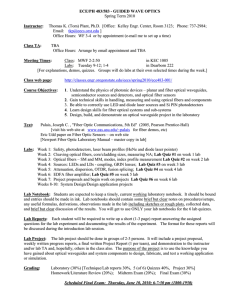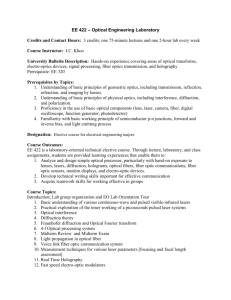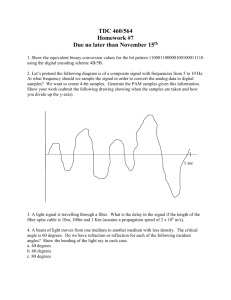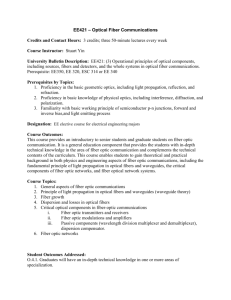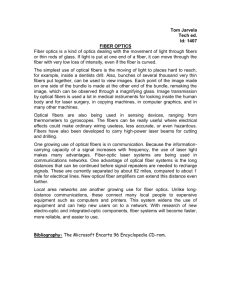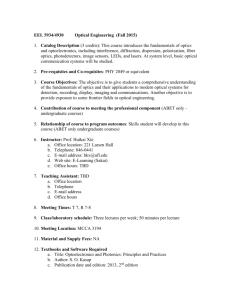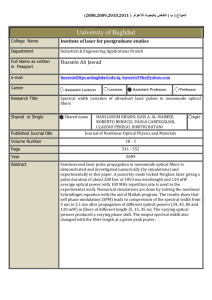4440 Optical Com Sys F 12
advertisement
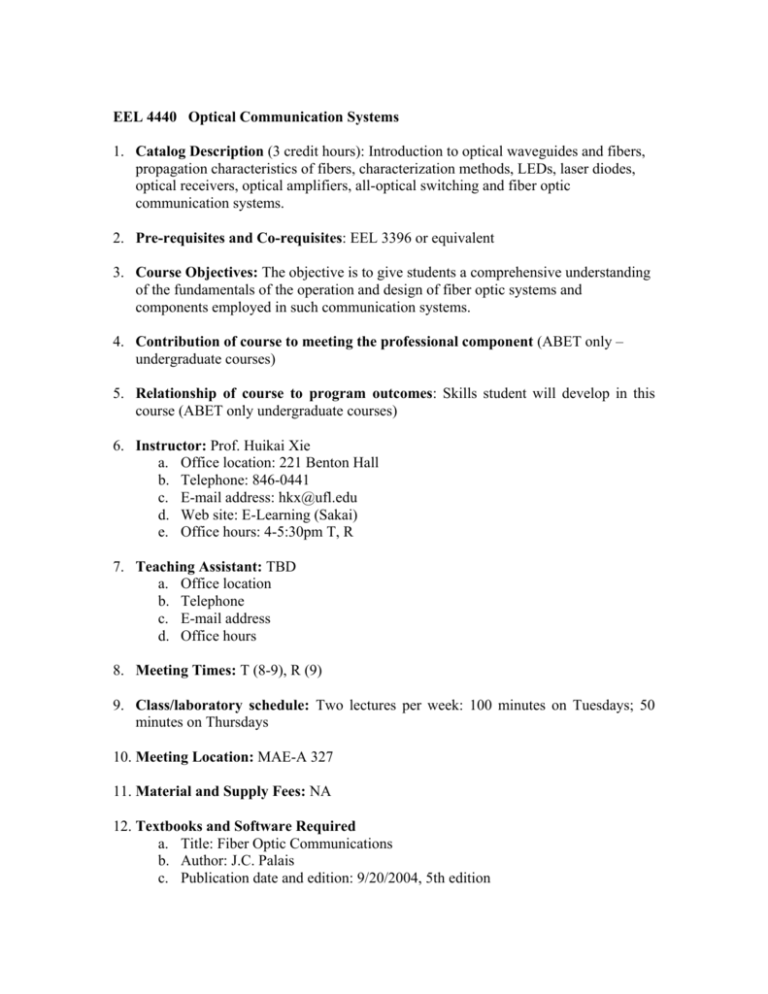
EEL 4440 Optical Communication Systems 1. Catalog Description (3 credit hours): Introduction to optical waveguides and fibers, propagation characteristics of fibers, characterization methods, LEDs, laser diodes, optical receivers, optical amplifiers, all-optical switching and fiber optic communication systems. 2. Pre-requisites and Co-requisites: EEL 3396 or equivalent 3. Course Objectives: The objective is to give students a comprehensive understanding of the fundamentals of the operation and design of fiber optic systems and components employed in such communication systems. 4. Contribution of course to meeting the professional component (ABET only – undergraduate courses) 5. Relationship of course to program outcomes: Skills student will develop in this course (ABET only undergraduate courses) 6. Instructor: Prof. Huikai Xie a. Office location: 221 Benton Hall b. Telephone: 846-0441 c. E-mail address: hkx@ufl.edu d. Web site: E-Learning (Sakai) e. Office hours: 4-5:30pm T, R 7. Teaching Assistant: TBD a. Office location b. Telephone c. E-mail address d. Office hours 8. Meeting Times: T (8-9), R (9) 9. Class/laboratory schedule: Two lectures per week: 100 minutes on Tuesdays; 50 minutes on Thursdays 10. Meeting Location: MAE-A 327 11. Material and Supply Fees: NA 12. Textbooks and Software Required a. Title: Fiber Optic Communications b. Author: J.C. Palais c. Publication date and edition: 9/20/2004, 5th edition d. ISBN number: 0130085103 13. Recommended Reading: - Optical Fiber Communications, Gerd Keiser, 4th Edition, McGraw-Hill, 2010 - Fiber-Optic Communication Systems, 4th Ed., G. P. Agrawal, John Wiley & Sons, 2010. - Optical Sources, Detectors, and Systems, Robert H. Kingston, Academic Press, 1995. - Understanding Fiber Optics, 5th Ed., Jeff Hecht, Prentice Hall, 2005. 14. Course Outline (provide topics covered by week or by class period) - Overview of fiberoptic communication systems: evolution, nature of light, advantages and applications - Optics review: Ray theory, lenses, imaging, numerical aperture, diffraction - Lightwave fundamentals: introduction to electromagnetic waves, wave equations, group velocity, dispersion, polarization, resonant cavities, total internal reflection - Integrated optic waveguides: dielectric-slab waveguide, modes, coupling, dispersion, integration - Optic fibers: step-index fibers, graded-index fibers, modes and fields in fibers, pulse broadening and information rate, fiber fabrication and characterization - Optical sources and amplifiers: PN junction, LEDs, laser principles, laser diodes, tunable laser diodes, VCSELs, modulation, optical amplifiers - Optical receivers: photomultipliers, photodiodes, APDs, responsivity, quantum efficiency, noise, heterodyne detection, preamplifiers - WDM concepts and components: WDM principles, NxN couplers, star couplers, add/drop multiplexers, fiber grating filters, tunable sources, and tunable filters. - All optical-switching: MEMS introduction, optical MEMS devices for optical switching 15. Attendance and Expectations: Attendance is required and no cell phone use is allowed in the class. 16. Grading: Homework: 20%; 1 Project: 20%; 3 Tests: 60% (20% each). 17. Grading Scale: 92-100 A; 88-91 A-; 84-87 B+; 80-83 B; 75-79 C+; 70-74 C; 65-69 D+; 60-64 D; and <60 E “A C- will not be a qualifying grade for critical tracking courses. In order to graduate, students must have an overall GPA and an upper-division GPA of 2.0 or better (C or better). Note: a C- average is equivalent to a GPA of 1.67, and therefore, it does not satisfy this graduation requirement. For more information on grades and grading policies, please visit: https://catalog.ufl.edu/ugrad/current/regulations/info/grades.aspx Undergraduate students, in order to graduate, must have an overall GPA and an upperdivision GPA of 2.0 or better (C or better). Note: a C- average is equivalent to a GPA of 1.67, and therefore, it does not satisfy this graduation requirement. Graduate students, in order to graduate, must have an overall GPA of 3.0 or better (B or better). Note: a Baverage is equivalent to a GPA of 2.67, and therefore, it does not satisfy this graduation requirement. For more information on grades and grading policies, please visit: https://catalog.ufl.edu/ugrad/current/regulations/info/grades.aspx 18. Make-up Exam Policy: No make-up exam 19. Honesty Policy – All students admitted to the University of Florida have signed a statement of academic honesty committing themselves to be honest in all academic work and understanding that failure to comply with this commitment will result in disciplinary action. This statement is a reminder to uphold your obligation as a UF student and to be honest in all work submitted and exams taken in this course and all others. 20. Accommodation for Students with Disabilities – Students Requesting classroom accommodation must first register with the Dean of Students Office. That office will provide the student with documentation that he/she must provide to the course instructor when requesting accommodation. 21. UF Counseling Services –Resources are available on-campus for students having personal problems or lacking clear career and academic goals. The resources include: UF Counseling & Wellness Center, 3190 Radio Rd, 392-1575, psychological and psychiatric services. Career Resource Center, Reitz Union, 392-1601, career and job search services. 22. Software Use – All faculty, staff and student of the University are required and expected to obey the laws and legal agreements governing software use. Failure to do so can lead to monetary damages and/or criminal penalties for the individual violator. Because such violations are also against University policies and rules, disciplinary action will be taken as appropriate. We, the members of the University of Florida community, pledge to uphold ourselves and our peers to the highest standards of honesty and integrity.
